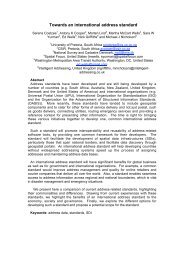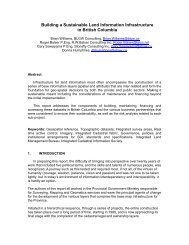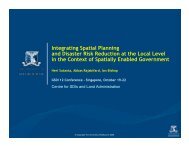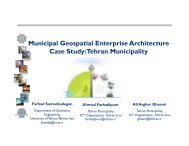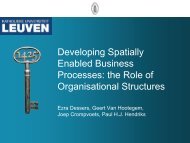SDI Convergence - Global Spatial Data Infrastructure Association
SDI Convergence - Global Spatial Data Infrastructure Association
SDI Convergence - Global Spatial Data Infrastructure Association
Create successful ePaper yourself
Turn your PDF publications into a flip-book with our unique Google optimized e-Paper software.
tion which does not measure a person’s exact route, but just the number and type of<br />
roads he or she drives on instead, thereby realising a lesser invasion of privacy<br />
(Pieper, 2007). Nevertheless, a rich database with up-to-date, accurate, precise information<br />
about activities on the Dutch roads will be available.<br />
3.1.2 RFID in public transport<br />
The introduction of a new chip-based system for public transport is a politically sensitive<br />
topic. The Dutch government has decided to push forward the plan to implement<br />
one public transport card which can be used nation-wide on the infrastructures of all<br />
suppliers (Teepe, 2008). In this system, at the start of a journey the traveller checks in<br />
by bringing the RFID-enabled card close to the card reader. At the place of destination,<br />
during check-out the appropriate fee will be charged to the electronic wallet in the card.<br />
One reason for implementing this system is to get a more honest distribution of income<br />
between the various public transport companies. At this moment, the system has already<br />
been implemented by local public transport providers in parts of the Netherlands.<br />
3.1.3 Mobile phone localisation in criminal investigation<br />
The local law enforcement of the Dutch city of Nijmegen used cell phones in March<br />
2006 to find possible witnesses to a criminal act. Three-thousand people received a<br />
text message asking them to contact the authorities if they could provide information<br />
about the murder of activist Louis Sévèke (Nu.nl, 2006). These people were not selected<br />
because they lived near the crime scene or because they were acquainted with<br />
the victim. They were merely selected because of their location or, to be more precise,<br />
the location of their cell phones at the time of the murder. This technological possibility<br />
instigated their involvement in the police investigation. The local law enforcement requested<br />
these data from the telecom providers and consequently, was able to send the<br />
request for information to the given phone numbers, resulting in several reactions. Little<br />
is known, however, about the psychological and social effects of this type of message.<br />
What were reasons to respond or not respond to this police call? Did people feel curious,<br />
scared, spied on or perhaps important or even appreciated? More research into<br />
this matter is desired in order to be able to assess the wanted and unwanted consequences<br />
of this kind of LBS-application.<br />
3.2 LBS logic<br />
3.2.1 LBS actors and data streams<br />
Location-based services are “IT services for providing information which has been created,<br />
compiled, selected or filtered taking into consideration the current locations of the<br />
users or those of other persons” (Küpper, 2005). Following this definition, generating<br />
information is the essence of LBS. Different positioning technologies can be used to do<br />
this. It follows that the LBS-user receives information based on his or her own location<br />
or that of other individuals. In the cases described in the previous section a government<br />
organisation places itself in the role of the LBS-user receiving information based on the<br />
location of citizens. For the technical realisation of LBS private parties play an important<br />
role as well. In addition, data streams from several other actors are also required<br />
for LBS. Based on Küpper’s LBS supply chain (2005), Figure 1 is a possible visualisation<br />
of this situation.<br />
78



